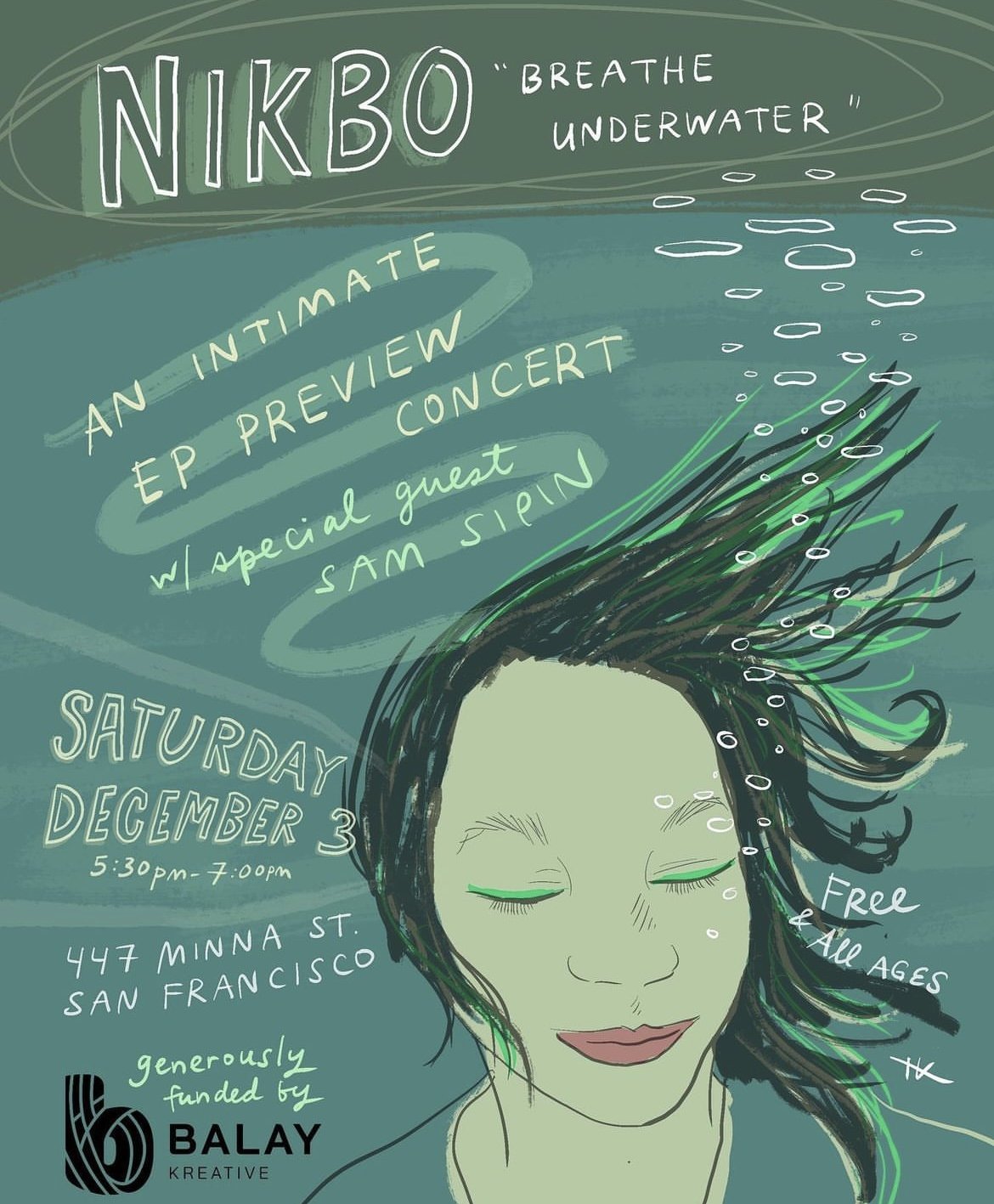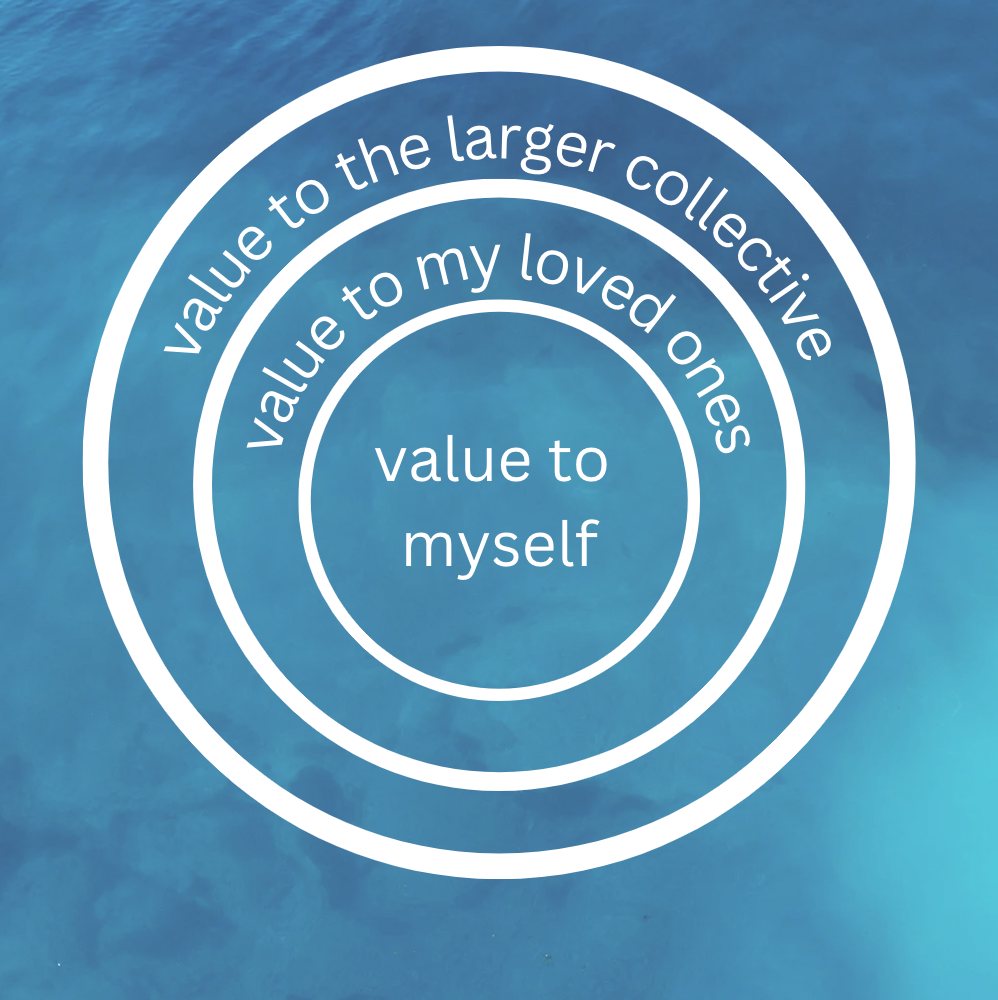Making Music That Transcends Borders with Nikbo
Musician and Balay Kreative Growth Grantee Nikbo (she/they) is a self-described “third culture kid who makes third culture pop.” This means that her pop music and lived experiences can not only be traced back to her Filipino heritage or to her Bay Area college life, but also to her family’s time spent in other parts of North America, eastern Africa, and central Asia. These influences come together to create a style of music that cannot be confined to a singular continent, country, or culture.
But there’s an added depth to this transcendence. During the pandemic, Nikbo experienced a lot of loss in her family. At the time, she was the only one of her family members living in the US and travel still wasn’t very practical. So she turned to music. Her sound traveled with the currents and flowed freely beyond borders to carry love letters to her loved ones. This project would come to be known as “Breathe Underwater,” Nikbo’s latest EP.
In an interview with Kurt Ison, Nikbo discusses her genre-fluid sound, navigating grief, and what she hopes to offer the world with her art.
Profile by Anne Lizette Sta. Maria
“I’m more than my Filipino identity; I’m more than any identity. Sometimes we feel like we want to exist in boxes because they feel safe and known and easy, but the boxes also keep us separated from each other and keep us from really seeing the full breadth of each other . . . I think artists have a special power to help people break out of those boxes and really connect.”
As a child, did you always know you wanted to be a musician? Who were some of your favorite musical artists growing up?
I did not always know I wanted to be a musician. There weren’t any artists or musicians in my family so I didn’t really know that was an option, but I’ve wanted to sing since I saw The Little Mermaid. And in my house growing up, my dad had a really big record collection; it was super eclectic. I remember the Bee Gees records, Crosby, Stills, Nash & Young. I also grew up in the 90s so the CDs that I remember on repeat were Mariah Carey, Celine Dion, and Paula Abdul. The first album I ever bought myself was Alanis Morissette’s Jagged Little Pill. That was when I started writing music.
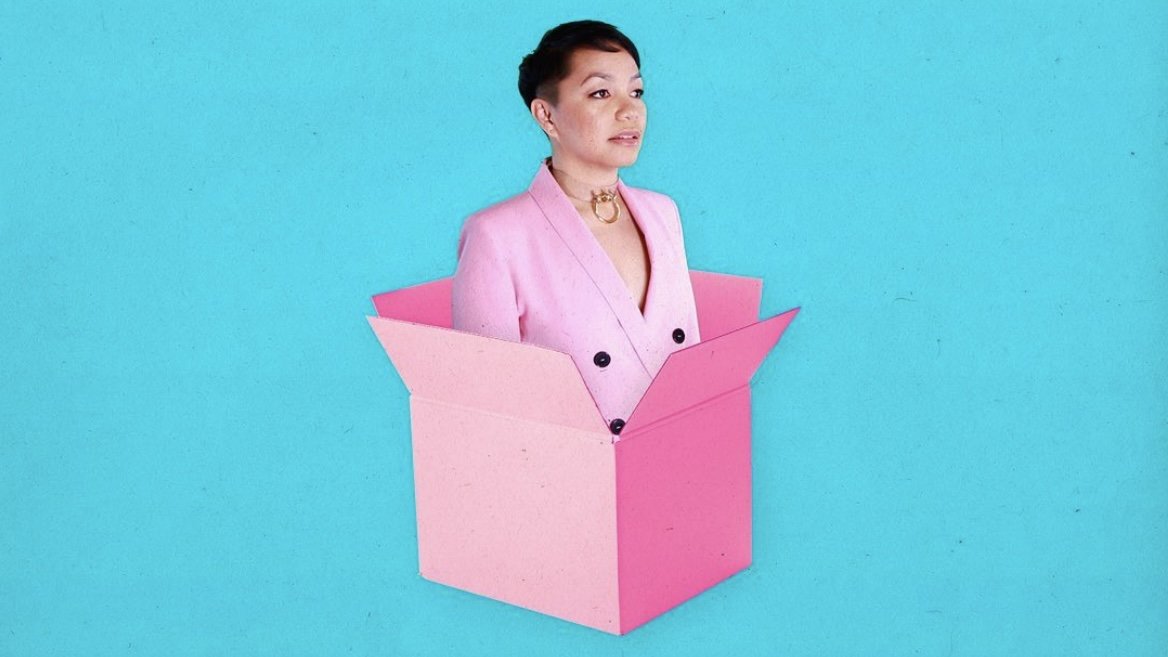
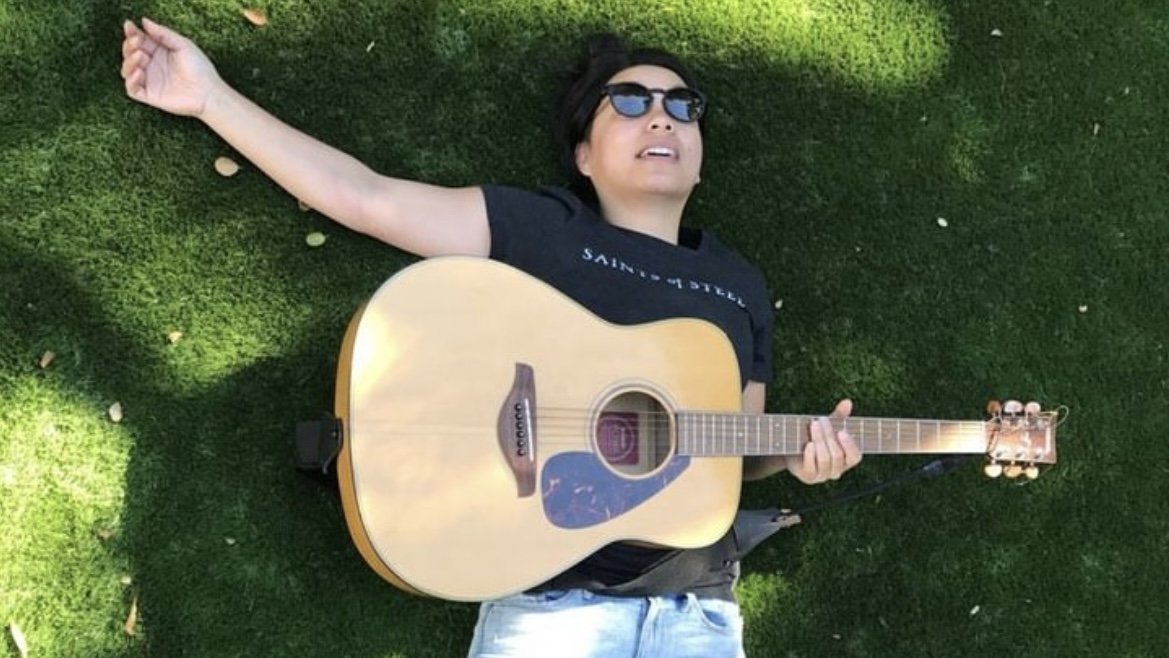
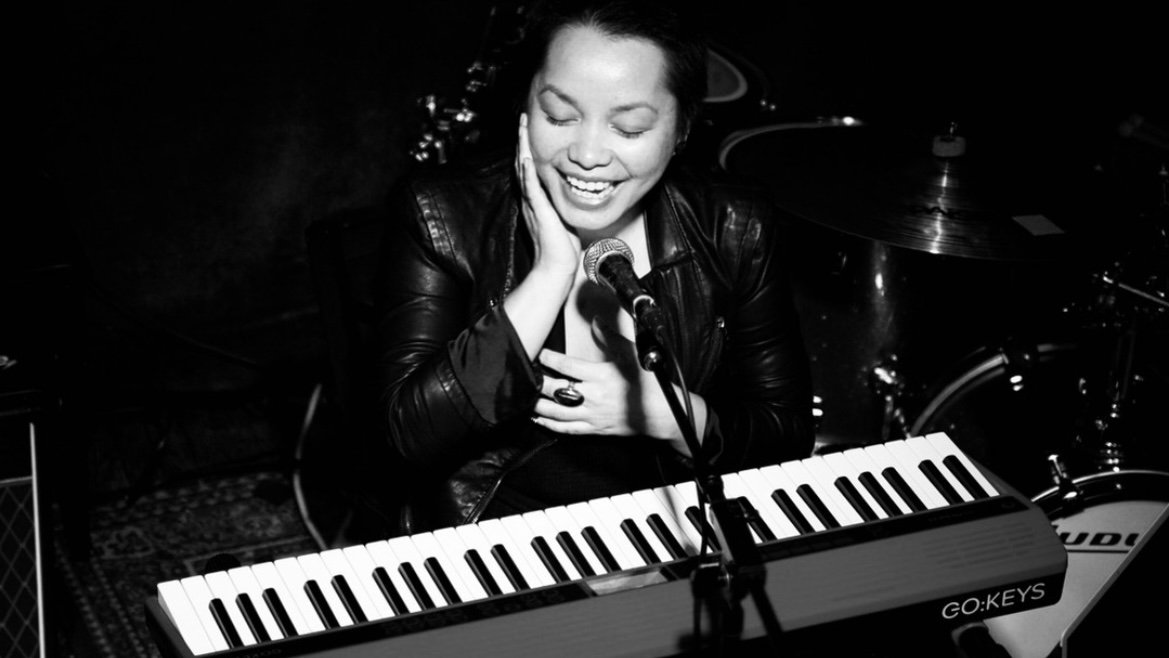
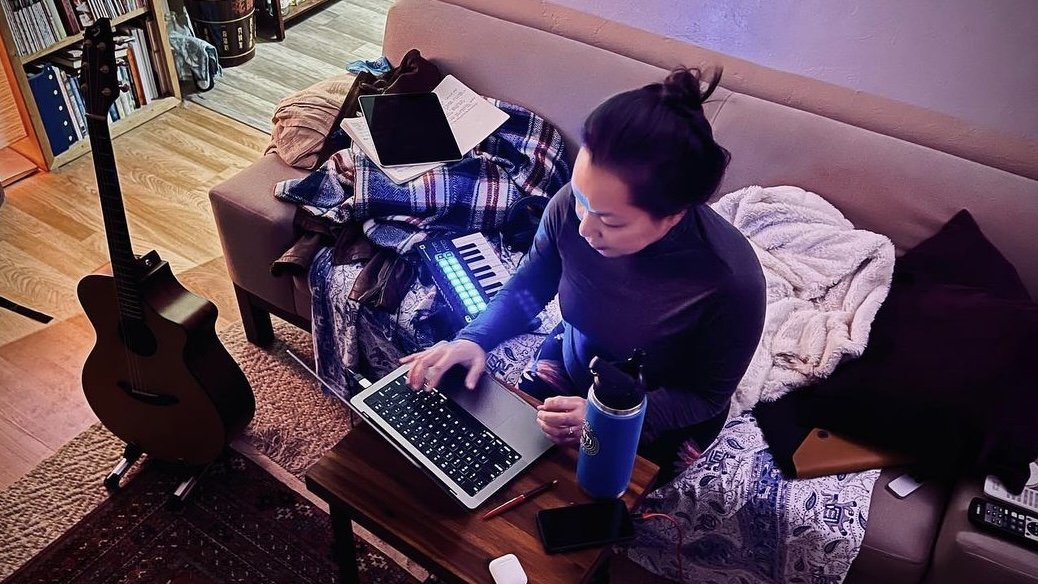
How would you describe your signature sound?
Purpose-wise, it’s like catharsis, but chill. My creative practice — making music — is a process for me to practice being more free to be more myself. I’m really into nervous system regulation these days. I find that really important for all of us because we live in such an intense time right now. When I make music, that is what I’m trying to practice for myself, so I hope that that’s what comes through.
Sound-wise, my sound’s kind of genre-fluid and there’s all these different micro-influences in it because I had such an eclectic upbringing. I’m a third culture kid. My parents were born in the Philippines. I was born in Morocco, and my parents raised me and my sibling in Morocco, Canada, Malawi, Kazakhstan, and a little bit in Mozambique before I moved here to the Bay Area for college. Third culture kids grow up in between cultures and make their own out of the two and out of the space they’re in. Actually, it’s funny that all of those places from eastern Africa to central Asia were all still dominated by Western pop charts, and they obviously have their own local native music too. So, my music is sort of like an outsider’s take on pop music.
Nikbo debuted her new EP with a performance in SOMA Pilipinas on December 3rd, 2022.
Can you talk a little bit about your current project?
With the support of Balay Kreative, I am working on an EP called “Breathe Underwater.” It came from a really lonely place in 2021. My mother in law passed away unexpectedly. My auntie passed away. A few other members in my family who I didn’t know as well passed away in a string in June 2021. They all passed away and I was like, “What’s happening to us?” I’m also the only person in my family that lives here in the US. Everyone else lives in Canada and the Philippines so during that time I still wasn’t traveling. I don’t remember if people were traveling in general. I just felt really far away from them and locked behind these borders. And that summer was really hard and lonely.
I withdrew from making music. I had just put out an album for a month. I was really excited about it, but there was just so much loss in our family that I kind of fell into a really hopeless place.
But then I took this writing workshop called “Mapping the Wilds of Grief,” and it was taught by an artist named Katrina Goldsaito. That workshop helped me reconnect with my music and my creative practice, as a way to heal, as a way to feel closer to my family. That workshop inspired me to start this project, interviewing my family, doing oral history and writing songs about the conversations we had and the stories they told. The beginning of that process started this summer. I went to Calgary where a lot of my family lives to interview folks and just really deepen our relationship. And the first three songs that came from that project are this EP “Breathe Underwater.” It’s a collaboration between me and my loved ones and my ancestors, and I’m really excited to share it with people.
How has being a part of Balay Kreative uplifted you?
Back story: when I first came here to the United States, I was so excited to meet a bunch of Filipinos because my sibling and I had always been the only Filipinos in school and I got here, and I was like, “Filipinos!” I had felt disconnected because I didn’t know the history and there were a lot of cultural touch points that I was missing. I felt a little out of place, an impostor. Over the years, I’ve put a lot of energy and time into learning more. The Bay Area’s such a rich cultural place for Filipinx artists and Filipinos. I’ve slowly been trying to tell myself that I belong here as a person in the Filipino diaspora.
Joining Balay Kreative and receiving the Balay Kreative Growth Grant was like an extra validation that my diaspora experience, my family’s experience, matters here. Aw, I’m getting emotional. Just being around this diverse group of artists with such different viewpoints and ways of expressing themselves… It's like, our art is so different; it all matters. So that was a big uplifting that I got from being a part of Balay Kreative.
What kind of statements are you looking to make with your music?
I always think of making art as concentric circles. So there’s my process and how it affects my closest circles, and then how it contributes to the collective. The values that I’m trying to remind myself are that my voice matters, my art matters, I matter in a world that’s always trying to tell you “Oh you need to be better, be different, be really unique. No. Fit in. Hahaha. You have to change yourself to be accepted.” Making music for me means there’s nothing I have to fix.
For my family, a lot of my songs are inspired by messages that we’ve exchanged. My songs are either actual or intended love letters or just things that I want to express to them that might be easier said in song.
And then for the larger collective, I just hope to contribute a space where you can feel things. In this fast paced society, we’re encouraged to move through the grief really fast so you can get your work done, don’t be a burden on people, don’t be too much, you can’t be too proud and too happy, you have to just be in the middle to be accepted. I feel like I get those messages a lot, so with my music, I want to offer a space where you can feel all the feelings that you need to process in the full real range of being a human in these intense times.
What would you say to aspiring Filipino artists? Why is it important for Filipinos to create?
This is a reminder as much for myself as for other artists, but that whoever you are, no matter where you grew up or who raised you, whether you identify as multiracial, you are Filipino enough and your experience and your story matters to the people around and contributes to the bigger collective.
Beyond that, and sort of in paradox to that, I think it’s important for us to keep creating — I’ll speak for myself — for me to keep creating to remind myself that I’m more than my Filipino identity; I’m more than any identity. Sometimes we feel like we want to exist in boxes because they feel safe and known and easy, but the boxes also keep us separated from each other and keep us from really seeing the full breadth of each other. They keep us from intimacy and connecting. I think artists have a special power to help people break out of those boxes and really connect.
Want know more about Nikbo? Be sure to follow @balaykreative and subscribe to our newsletter to hear about her future artwork! Check out our interview with her below.

